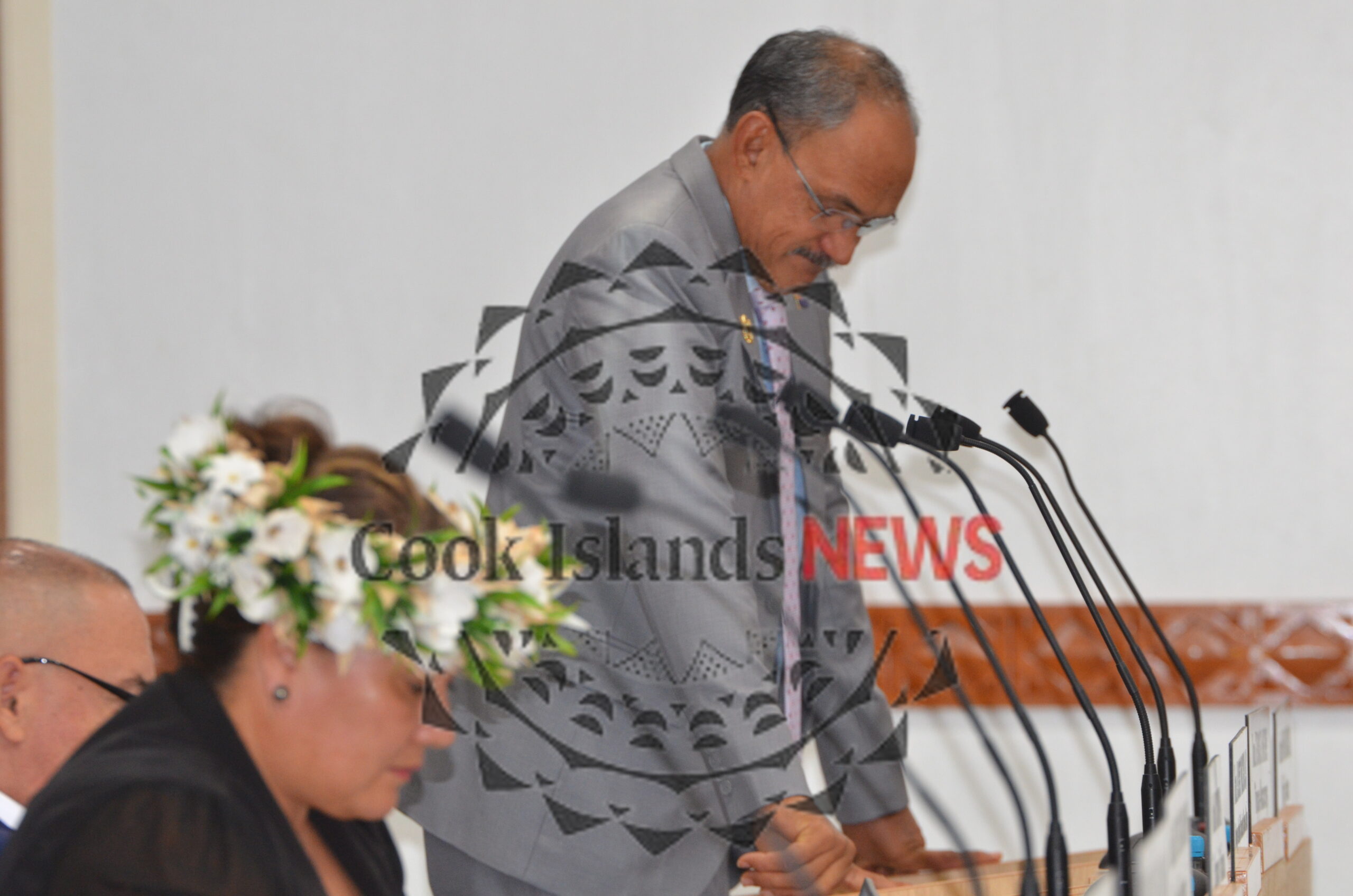Education ‘master plan’ to improve NCEA pass rates
Friday 1 March 2024 | Written by Losirene Lacanivalu | Published in Education, National

Education Minister Vaine (Mac) Mokoroa in Parliament on February 28, 2024. LOSIRENE LACANIVALU / 24022980
The Ministry of Education has started developing a new education master plan with support from the Asian Development Bank (ADB), and with this they aim for an 80 per cent pass rate for NCEA levels.
Education Minister Vaine (Mac) Mokoroa says the Cook Islands Ministry of Education aims for an 80 per cent NCEA pass rate, echoing New Zealand Prime Minister’s target.
Mokoroa responded to a question in Parliament this week from Opposition MP Vaitoti Tupa regarding concerns about National Certificate of Educational Achievement (NCEA) literacy and numeracy test results.
Tupa expressed concern about the “18 per cent pass rate” and inquired about the government’s plans to improve the education system.
Mokoroa clarified that the 18 per cent pass rate represented the average for all realm countries, including New Zealand, Tokelau, and Niue.
“Even then 18 per cent is also too low and we need to raise this level of passes,” Mokoroa said.
The new NCEA literacy and numeracy test, still in its pilot phase, saw only 18 per cent of the 242 Cook Islands and Niuean students who participated in June last year pass reading, 45 per cent pass writing, and 23 per cent pass numeracy. However, Cook Islands results showed improvement compared to 2022, with pass rates of 17 per cent in reading, 16 per cent in writing, and 17 per cent in mathematics.
Mokoroa highlighted that the standard NCEA results for the Cook Islands have consistently been over 70 per cent, with 2023 statistics showing a 70 per cent overall pass rate with 76 per cent in Level 3, 75 per cent in Level 2, and 62 per cent in Level 1.
In response to Cook Islands News inquiries, Mokoroa explained: “It is important to note that in 2022, NZQA was piloting a new literacy and numeracy credit system taken by our Year 10 students. The results were disappointing but consistent with the broader pilot outcomes.”
He emphasised the importance of the new education masterplan, which aims to reset the system by placing a strong emphasis on the first seven years of education, from early childhood onwards.
“Extensive research underscores the critical importance of these formative years in a child’s educational outcomes and brain development. This will lead to improved educational performance in the longer term as these students enter secondary education and NCEA.”
Addressing strategies and considerations for educational performance, Mokoroa emphasised that the Cook Islands are not alone in facing this challenge.
He pointed to New Zealand’s acknowledgment of NCEA shortcomings and its initiation of reforms to raise qualification standards.
“Consequently, both countries are now grappling with this issue, and it is a complex process that will take time.
“The recent changes in the NCEA, including a heightened emphasis on external exams, signify a departure from the previous reliance on internal exams and easy unit standards to lift pass rates.”
Mokoroa emphasised the need to address literacy and numeracy rates at the primary level, as these skills are now often acquired in Year 10 instead of Year 11, reflecting a shift in the educational landscape.
He also highlighted the importance of teacher training, acknowledging the global teacher shortage.
“The strategy involves enhancing the training, development, and resourcing of teachers to attract and nurture talent locally. Emphasis on teaching the Maori language is vital, as it aligns with language revitalisation and correlates strongly with educational success.”
Mokoroa said they also need to resource teachers fairly and equitably, providing them with conditions that enable them to perform effectively. In return, they expect teachers to deliver results and exceptional outcomes for students.
The Minister acknowledged ongoing challenges with remuneration, quality, and resourcing.
Other key components included in the master plan revealed by the Minister are aligning the curriculum with quality standards, embracing technology for equitable educational opportunities across the whole country, and improving data utilisation for monitoring student progress.
“Principals need to be empowered, supported, and entrusted to run schools efficiently, with an expectation for tangible results.”
Mokoroa said that the additional support will be directed towards NCEA level students facing challenges.
He revealed that technology will be utilised to track student progress, identify areas for improvement, and measure the effectiveness of interventions.
And teachers will be held accountable for their students’ results, emphasising a personal commitment to each student’s success.
The Ministry further aims to improve pass rates across various NCEA levels through:
• Maintaining a closer relationship with NZQA and Ministry of Education NZ in order to remain updated with the changes incurring with NCEA programme;
• Continue professional development and upskilling of staff in secondary schools with the changes in the programme and;
• Most importantly improving the exposure for learners so that they can efficiently complete their examinations on the NCEA digital platform.
Mokoroa said that immediate efforts are also being made to raise internet capability standards, including the purchase of Starlink technology.














































